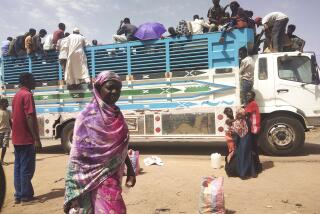Bush Proposes Major Boost in Development Aid
WASHINGTON â President Bush said Thursday that he will seek $5 billion over three years in new assistance to developing nations, but to qualify the countries must root out corruption, demonstrate support for human rights and promote democratic and economic reforms.
He also linked his aid proposal to the war on terrorism, asserting that poverty and misery can lead to hopelessness and despair--conditions that he said can help breed terrorism.
The funding increase, if approved by Congress, would be substantial: Worldwide, the United States now provides about $17 billion a year in development aid for education, health, business promotion and other such programs.
Bush made his announcement at the Inter-American Development Bank here, and it came a week before he is to join other world leaders in Monterrey, Mexico, for a United Nations conference on development.
âThis growing divide between wealth and poverty, between opportunity and misery, is both a challenge to our compassion and a source of instability,â Bush said. âWe must confront it. We must include every African, every Asian, every Latin American, every Muslim in an expanding circle of development.â
He also said, âAlong with significant new resources to fight world poverty, we will insist on the reforms necessary to make this a fight we win.â
Bushâs funding increase would be âvery, very significant,â said Carol Graham, co-director of the Center on Social and Economic Dynamics at the Brookings Institution.
Despite the traditional Capitol Hill skepticism about foreign aid, Graham said Bush may have a good chance of getting his request, particularly if he succeeds in linking such aid to combating terrorism.
The president would start the additional funding in the 2004 fiscal year, which begins Oct. 1, 2003. Several nongovernmental development agencies, as well as House Minority Leader Richard A. Gephardt (D-Mo.), called for expediting Bushâs proposal.
âThis is a breakthrough change of direction, [but] we question why the money canât be available sooner--poverty is a matter of life and death,â said Raymond C. Offenheiser, president of Oxfam America, which works to alleviate global hunger and poverty.
Gephardt agreed with Bush that âmore accountability is needed from recipient governments.â But he urged him to âaccelerate the timetable . . . and provide real resources immediately.â
Bush also set an admittedly ambitious goal of doubling the economies of the poorest nations within a decade.
âI know some may say thatâs too high a hurdle to cross. I donât believe so--not with the right reforms and the right policy.â
Among those who joined the president for his announcement at the Inter-American Development Bank--which seeks to promote development in Latin America and the Caribbean--was U2 singer Bono, whose company Bush evidently enjoyed.
The two spent time in the Oval Office before sharing a ride in the presidentâs limousine to the event--and then back to the White House.
Bush lauded Bonoâs work on behalf of developing nations. âHe is willing to use his position in a responsible way. He is willing to lead to achieve what his heart tells him, and that is nobody, nobody should be living in poverty and hopelessness in the world.â
Bush said he has directed Secretary of State Colin L. Powell and Treasury Secretary Paul H. OâNeill to develop âa set of clear and concrete and objective criteriaâ for measuring the progress of recipient nations on the broad standards he laid out.
âWhen nations refuse to enact sound policies, progress against poverty is nearly impossible,â Bush said. âIn these situations, more aid money can actually be counterproductive, because it subsidizes bad policies, delays reform and crowds out private investment.â
Bush also repeated his call to the World Bank and other financial institutions to provide as much as 50% of their assistance to the poorest nations in the form of grants rather than loans. But some Europeans say grants should be limited, to perhaps 10%, lest they jeopardize the future lending base of the institutions.
The president chose his words carefully as he made his case that there is a connection between a war on poverty and the war on terrorism.
âPoverty doesnât cause terrorism. Being poor doesnât make you a murderer. Most of the plotters of September the 11th were raised in comfort,â Bush said.
âYet persistent poverty and oppression can lead to hopelessness and despair. And when governments fail to meet the most basic needs of their people, these failed states can become havens for terror,â he added, citing Afghanistan as an example.
âIn World War II, we fought to make the world safer, then worked to rebuild it. As we wage war today to keep the world safe from terror, we must also work to make the world a better place for all its citizens,â Bush said.
âWe cannot leave behind half of humanity as we seek a better future for ourselves,â he said.
More to Read
Get the L.A. Times Politics newsletter
Deeply reported insights into legislation, politics and policy from Sacramento, Washington and beyond. In your inbox three times per week.
You may occasionally receive promotional content from the Los Angeles Times.










